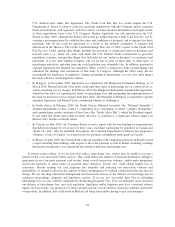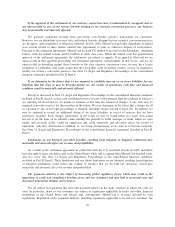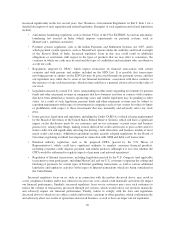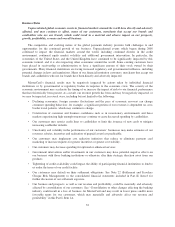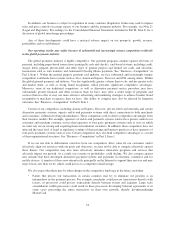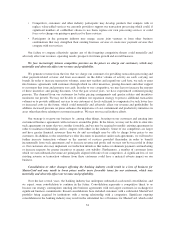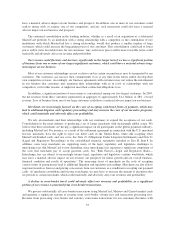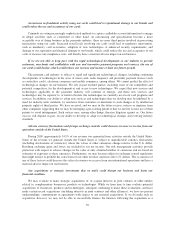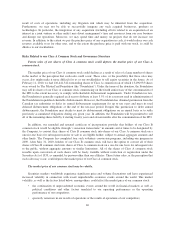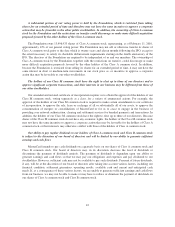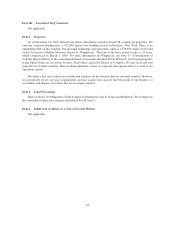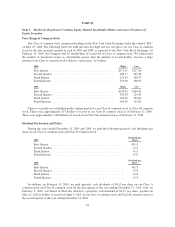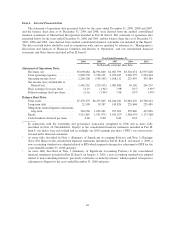MasterCard 2009 Annual Report Download - page 46
Download and view the complete annual report
Please find page 46 of the 2009 MasterCard annual report below. You can navigate through the pages in the report by either clicking on the pages listed below, or by using the keyword search tool below to find specific information within the annual report.cross-border travel and our customers’ need for transactions to be converted into their base currency. Cross-
border travel may be adversely affected by world geopolitical, economic and other conditions. These include the
threat of terrorism and outbreaks of flu (such as H1N1), viruses (such as SARS) and other diseases. Any such
decline in cross-border travel could adversely affect our revenues and profitability.
Certain customers have exclusive, or nearly- exclusive, relationships with our competitors to issue
payment cards, and these relationships may adversely affect our ability to maintain or increase our revenues.
Certain customers have exclusive, or nearly-exclusive, relationships with our competitors to issue payment
cards, and these relationships may make it difficult or cost-prohibitive for us to do significant amounts of
business with them to increase our revenues. In addition, these customers may be more successful and may grow
faster than the customers that primarily issue our cards, which could put us at a competitive disadvantage.
Furthermore, we earn substantial revenue from customers with exclusive or nearly-exclusive relationships with
our competitors. Such relationships could provide advantages to the customers to shift business from MasterCard
to the competitors with which they are principally aligned. A significant loss of our existing revenue or
transaction volumes from these customers could have a material adverse impact on our business.
We depend significantly on our relationships with our customers to manage our payment system. If we
are unable to maintain those relationships, or if our customers are unable to maintain their relationships with
cardholders or merchants that accept our cards for payment, our business may be materially and adversely
affected.
We are, and will continue to be, significantly dependent on our relationships with our issuers and acquirers
and their further relationships with cardholders and merchants to support our programs and services. We do not
issue cards, extend credit to cardholders or determine the interest rates (if applicable) or other fees charged to
cardholders using cards that carry our brands. Each issuer determines these and most other competitive card
features. In addition, we do not establish the discount rate that merchants are charged for card acceptance, which
is the responsibility of our acquiring customers. As a result, our business significantly depends on the continued
success and competitiveness of our issuing and acquiring customers and the strength of our relationships with
them. In turn, our customers’ success depends on a variety of factors over which we have little or no influence. If
our customers become financially unstable, we may lose revenue or we may be exposed to settlement risk as
described below.
With the exception of the United States and a select number of other jurisdictions, most in-country (as
opposed to cross-border) transactions conducted using MasterCard, Maestro and Cirrus cards are authorized,
cleared and settled by our customers or other processors without involving our central processing systems.
Because we do not provide domestic processing services in these countries and do not, as described above, have
direct relationships with cardholders or merchants, we depend on our close working relationships with our
customers to effectively manage our brands, and the perception of our payment system among regulators,
merchants and consumers in these countries. From time to time, our customers may take actions that we do not
believe to be in the best interests of our payment system overall, which may materially and adversely impact our
business. If our customers’ actions cause significant negative perception of the global payments industry or our
brands, cardholders may reduce the usage of our programs, which could reduce our revenues and profitability.
In addition, our competitors may process a greater percentage of domestic transactions in jurisdictions
outside the United States than we do. As a result, our inability to control the end-to-end processing on cards
carrying our brands in many markets may put us at a competitive disadvantage by limiting our ability to maintain
transaction integrity or introduce value-added programs and services that are dependent upon us processing the
underlying transactions.
36




